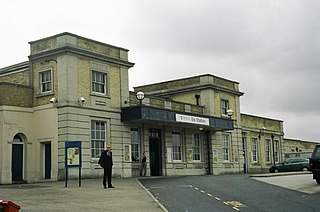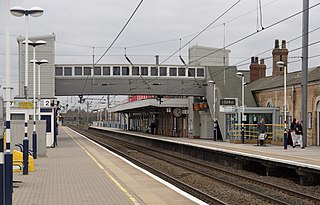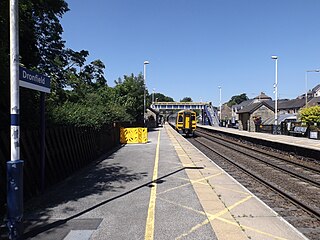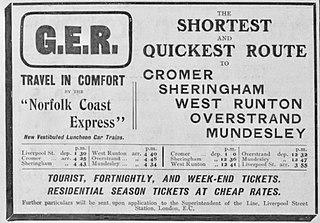
The West Coast Main Line (WCML) is one of the most important railway corridors in the United Kingdom, connecting the major cities of London and Glasgow with branches to Birmingham, Liverpool, Manchester and Edinburgh. It is one of the busiest mixed-traffic railway routes in Europe, carrying a mixture of intercity rail, regional rail, commuter rail and rail freight traffic. The core route of the WCML runs from London to Glasgow for 399 miles (642 km) and was opened from 1837 to 1869. With additional lines deviating to Northampton, Birmingham, Manchester, Liverpool and Edinburgh, this totals a route mileage of 700 miles (1,127 km). The Glasgow–Edinburgh via Carstairs line connects the WCML to Edinburgh, however the main London–Edinburgh route is the East Coast Main Line. Several sections of the WCML form part of the suburban railway systems in London, Coventry, Birmingham, Liverpool, Manchester and Glasgow, with many more smaller commuter stations, as well as providing links to more rural towns.

Sheffield station, formerly Pond Street and later Sheffield Midland, is a combined railway station and tram stop in Sheffield, England, and the busiest station in South Yorkshire. Adjacent is Sheffield station/Sheffield Hallam University Sheffield Supertram stop. In 2017–18, the station was the 43rd-busiest in the UK, and the 15th-busiest outside London.

The Great Eastern Main Line is a 114.5-mile (184.3 km) major railway line on the British railway system which connects Liverpool Street station in central London with destinations in east London and the East of England, including Shenfield, Chelmsford, Colchester, Ipswich and Norwich. Its numerous branches also connect the main line to Southminster, Braintree, Sudbury, Harwich and a number of coastal towns including Southend-on-Sea, Clacton-on-Sea, Walton-on-the-Naze and Lowestoft.

York railway station is on the East Coast Main Line serving the city of York, North Yorkshire, England. It is 188 miles 40 chains (303.4 km) north of London King's Cross and on the main line it is situated between Doncaster to the south and Thirsk to the north. As of June 2018, the station is operated by London North Eastern Railway.

The East Suffolk line is an un-electrified 49-mile secondary railway line running between Ipswich and Lowestoft in Suffolk, England. The traffic along the route consists of passenger services operated by Greater Anglia, while nuclear flask trains for the Sizewell nuclear power stations are operated by Direct Rail Services.

Chesterfield railway station serves the town of Chesterfield in Derbyshire, England. It lies on the Midland Main Line. Four tracks pass through the station which has three platforms. It is currently operated by East Midlands Railway.

Norwich railway station is the northern terminus of the Great Eastern Main Line in the East of England, serving the city of Norwich, Norfolk. It is 114 miles 77 chains (185.0 km) down the main line from London Liverpool Street, the western terminus.

Ely railway station is on the Fen line in the east of England, serving the city of Ely, Cambridgeshire. It is 70 miles 30 chains (113.3 km) from London Liverpool Street and is situated between Waterbeach and Littleport stations on the Fen line to King's Lynn. It is an important junction for three other lines; the Ely to Peterborough Line, the Ipswich to Ely Line and the Norwich to Ely line.

Newark Northgate railway station is on the East Coast Main Line in the United Kingdom, serving the town of Newark-on-Trent, Nottinghamshire. It is 120 miles 8 chains (193.3 km) down the line from London King's Cross and is situated on the main line between Grantham to the south and Retford to the north. The station is Grade II listed.

Peterborough railway station serves the city of Peterborough, Cambridgeshire, England. It is 76 miles 29 chains (122.9 km) down the East Coast Main Line from London King's Cross. The station is a major interchange serving both the north–south ECML, as well as long-distance and local east–west services. The station is managed by London North Eastern Railway. Ticket gates came into use at the station in 2012.

Darlington railway station is on the East Coast Main Line in the United Kingdom, serving the town of Darlington, County Durham. It is 232 miles 50 chains north of London King's Cross and on the main line it is situated between Northallerton to the south and Durham to the north. Its three-letter station code is DAR.

Dronfield railway station serves the town of Dronfield in Derbyshire, England, south of Sheffield, on the Midland Main Line between Chesterfield and Sheffield.

Harwich International railway station on the Mayflower Line, a branch of the Great Eastern Main Line, serves Harwich International Port in Essex, England. It is 68 miles 72 chains (110.88 km) from London Liverpool Street, between Wrabness to the west and Dovercourt to the east. Its three-letter station code, HPQ, derives from its original name, Harwich Parkeston Quay.

Chester railway station is located in Newtown, Chester, England. Services are operated by Avanti West Coast, Merseyrail, Northern and Transport for Wales. From 1875 to 1969 the station was known as Chester General to distinguish it from Chester Northgate. The station's Italianate frontage was designed by the architect Francis Thompson.

Sheringham railway station is the northern terminus of the Bittern Line in Norfolk, England, serving the town of Sheringham. It is 30 miles 22 chains down the line from Norwich. Its three-letter station code is SHM.

Aslockton railway station serves the English villages of Aslockton and Whatton-in-the-Vale in Nottinghamshire. It also draws passengers from other nearby villages. It is 10 miles east of Nottingham on the Nottingham–Skegness Line.

The Mid-Day Scot was a British express passenger train launched in 1927 running from Edinburgh Princes Street and Glasgow Central, joining to form a train to London Euston.
The Aberdonian was a named passenger train operating in the United Kingdom.

The Norfolk Coast Express was a named passenger train operating in the United Kingdom.


















